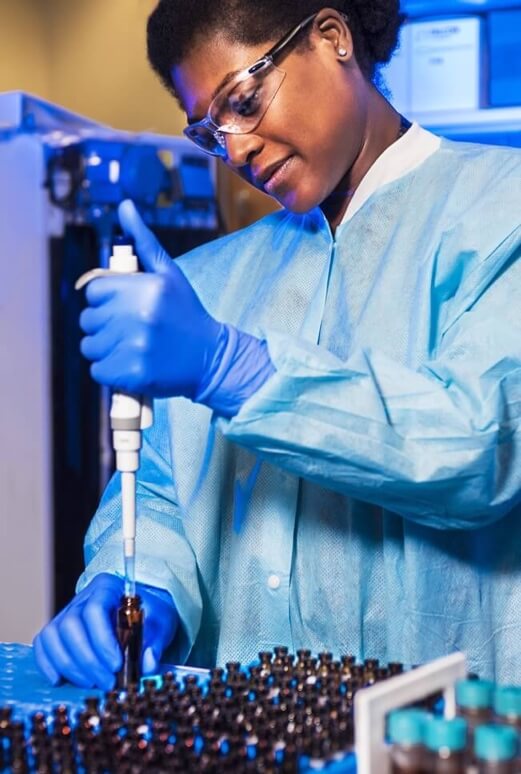Join Us
Careers in Biology
Biology is at the heart of some of the biggest challenges facing humanity and our planet. From improving human health to tackling climate change, enhancing agriculture to conserving the environment, biologists play an important role.
A Career In Biology
Pursuing a career in biology can be immensely rewarding and exciting. Studying biology teaches you to ask questions, make detailed observations, evaluate evidence, and solve problems.
Biologists learn:
- how living things work
- how living things interact with one another
- how living things evolve

A Centers for Disease Control and Prevention (CDC) laboratory technician, dressed in personal protective equipment (PPE), pipetting samples of bronchoalveolar lavage (BAL) fluid, to undergo analysis in this laboratory. Credit: CDC
Biologists study the evolution, natural history, and conservation of plants and animals; investigate the interactions of living organisms with light, the environment, or each other; and work to advance pharmaceuticals, biotechnology, and medical research.
Studying biology can lead to a wide range of careers, from research to teaching, health care to policymaking.
AIBS Career Resources
Interested in being notified about potential student opportunities within the scientific community? Please sign up to our student email list.
- AIBS professional development workshops and courses
- Articles from our journal, BioScience
- “In Their Own Words” in BioScience and the BioScience Talks Podcast
- Graduate students: Apply for the Emerging Public Policy Leadership Award
- Fellowships, internships, and training opportunities in science policy for biology students
- Join a scientific society in your field of biology
- Engage in science policy through the AIBS Legislative Action Center
- Follow the AIBS page on LinkedIn
Career Resources From Our Members
Job Hunting
- American Society of Ichthyologists and Herpetologists
- American Society of Plant Taxonomists
- Animal Behavior Society
- Association for Tropical Biology and Conservation
- Botanical Society of America
- Cary Institute of Ecosystem Studies
- Center for Advancing Research Impact in Society
- Organization of Biological Field Stations
- Paleontological Society
- Phycological Society of America
- Radiation Research Society
- Society for Behavioral Neuroendocrinology
- Society for Ethnobotany
- Society for Freshwater Science
- Society for In Vitro Biology
- Society for Integrative and Comparative Biology
- Society for the Preservation of Natural History Collections
- Society for the Study of Evolution
- Society of Herbarium Curators
Career Resources
- American Ornithological Society
- American Society of Mammalogists
- American Society of Parasitologists
- Association for the Sciences of Limnology and Oceanography
- Ecological Society of America
- Human Anatomy & Physiology Society
- Institute of Environment, Florida International University
- Society for Industrial Microbiology and Biotechnology
- Society for the Advancement of Chicanos and Native Americans in Science
- Weed Science Society of America
Career Development and Job Hunting
- AAAS Science Careers Page
- ConservationJobs
- Conservation Job Board
- GoGovernment—How to Apply for Government Jobs
- National Academy of Sciences Careers
- Howard Hughes Medical Institute Careers
- The Scientist Magazine Careers Search Engine
- Science Policy Fellowships
- Sloan Career Cornerstone Center - STEM Career Planning
Research Experiences for Undergraduate Programs
Experiencing research first-hand is an ideal way to evaluate and start a potential career in biology.
The National Science Foundation supports active research participation by undergraduate students through the Research Experiences for Undergraduates (REU) program. Program alumni report that the experience was instrumental to their careers. Students often receive housing and a stipend as a part of the program.
